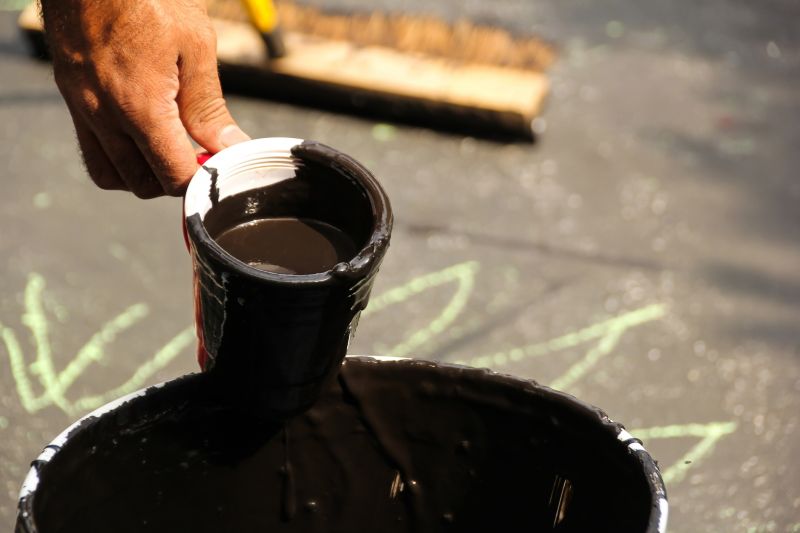Top Sealcoating Tools And Supplies For Professional Use
Identify the most effective tools and materials that streamline application and ensure durable, professional finishes.
 Sealcoating is an essential maintenance process for asphalt surfaces, providing a protective layer that helps extend the lifespan of pavements and enhances their appearance. The effectiveness of a sealcoating project depends heavily on the quality and suitability of the products used. From liquid sealers to specialized additives, a wide range of items are available to cater to different project requirements and surface conditions. Choosing the right products involves understanding their composition, application methods, and compatibility with existing pavements.
Sealcoating is an essential maintenance process for asphalt surfaces, providing a protective layer that helps extend the lifespan of pavements and enhances their appearance. The effectiveness of a sealcoating project depends heavily on the quality and suitability of the products used. From liquid sealers to specialized additives, a wide range of items are available to cater to different project requirements and surface conditions. Choosing the right products involves understanding their composition, application methods, and compatibility with existing pavements.
Top Overall Option
Premium Asphalt Sealant
A versatile and durable asphalt sealant designed for professional and DIY applications, offering excellent adhesion and weather resistance. Its easy-to-apply formulation helps create a smooth, protective coating that can enhance the longevity of asphalt surfaces when used properly.
Types of Products For Sealcoating Service
Liquid Asphalt Sealers
Standard liquid sealers formulated for easy application, providing a protective layer over asphalt surfaces.
Coal Tar Sealers
Resilient sealers known for their durability and resistance to chemicals and UV rays.
Acrylic Sealers
Flexible and quick-drying options that offer UV protection and color enhancement.
Emulsified Sealers
Water-based formulations suitable for environmentally conscious projects with easy cleanup.
Aggregate Additives
Materials added to sealers to improve traction and aesthetic appeal.
Crack Fillers
Specialized products designed to fill and seal cracks prior to sealcoating.
Brush-Apply Sealers
Sealants formulated for manual application with brushes or squeegees.
Spray-Apply Sealers
Products compatible with spray systems for quick and uniform coverage.
Rapid-Dry Sealers
Formulations that dry quickly to minimize downtime between coats.
High-Gloss Sealers
Sealants designed to provide a shiny, reflective finish.
Textured Sealers
Products that add a non-slip surface for safety and aesthetic purposes.
Waterproofing Sealers
Sealants with enhanced water resistance for areas exposed to frequent moisture.
UV-Resistant Sealers
Formulations that help protect asphalt from sun damage and fading.
Industrial Grade Sealers
Heavy-duty options suitable for commercial and industrial applications.
Eco-Friendly Sealers
Low-VOC options designed for environmentally sensitive projects.
Popular Choices
Widely used for their ease of application and reliable coverage.
Known for their toughness and long-lasting properties.
Favored for their quick drying times and UV protection.
Popular for water-based projects and easier cleanup.
Commonly used to prepare surfaces before sealing.
Preferred for large areas requiring quick coverage.
Chosen for aesthetic enhancement of parking lots and driveways.
Selected for safety features and decorative finishes.
Ideal for surfaces exposed to frequent moisture.
Popular for outdoor applications needing sun protection.
Valued for minimizing project downtime.
Common in commercial and high-traffic areas.
Growing in popularity for environmentally conscious projects.
Proper preparation is crucial before applying sealcoating products. Surface cleaning, crack filling, and ensuring the asphalt is dry and free of debris set the foundation for successful sealing. Once prepared, selecting the appropriate sealcoating product can help achieve a uniform, durable finish. These products vary in viscosity, drying time, and coverage rate, making it important to match them with specific project needs.
In addition to traditional liquid sealers, there are specialized formulations including coal tar-based, asphalt-based, and acrylic sealers. Each type offers different properties such as UV resistance, flexibility, and resistance to chemicals or water intrusion. Some products come with added aggregate or textured finishes to improve traction and aesthetics. Proper application tools, such as spray systems, squeegees, or brushes, also influence the final outcome.
Investing in high-quality products and understanding their features can help contractors and property owners achieve better results. Regular maintenance and timely reapplication are key to preserving the integrity of asphalt surfaces. Whether managing parking lots, driveways, or private roads, selecting the right products ensures a more efficient sealing process and a long-lasting finish.
Key Buying Considerations
- Surface compatibility: Ensure the product is suitable for your specific asphalt surface.
- Application method: Choose between spray, squeegee, or brush application based on project size and detail.
- Drying time: Consider how quickly the product dries to plan application schedules.
- Coverage rate: Check the estimated coverage per gallon to determine quantity needed.
- Weather conditions: Avoid applying sealers in extreme temperatures or when rain is forecasted.
- Durability and resistance: Look for products with features that match your environmental exposure needs.
- Finish appearance: Decide if a matte, satin, or gloss finish aligns with your aesthetic goals.
- Environmental impact: Consider VOC levels and cleanup requirements.
- Cost and budget: Balance quality with affordability for your project scope.
- Compatibility with existing surfaces: Confirm that the product adheres well to current asphalt and previous coatings.
- Additives and enhancements: Determine if additional features like traction or color are desired.
- Application tools: Ensure you have the proper equipment compatible with the product.
- Maintenance requirements: Understand how often reapplication might be needed.
- Manufacturer reputation: Choose products from trusted suppliers with good technical support.
- Regulatory compliance: Verify that the product meets local regulations and standards.
